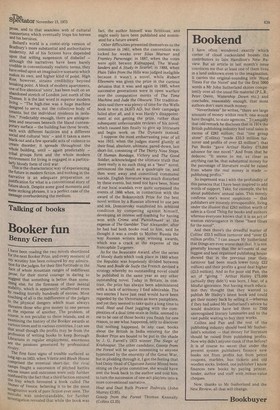Talking of books
Booker fun
Benny Green
I have been reading the two novels shortlisted for the next Booker Prize, and every moment of my scrutiny has been coloured by my admiration for the judges, for their fine fortitude in the face of whole mountain ranges of indifferent prose, for their moral courage in daring to suggest that something is better than something else, for the firmness of their mental stability, which is apparently unaffected even by reading literally hundreds of entries. Most touching of all is the indifference of the judges Ic) the physical dangers which must always threaten those who give money to one person at the expense of another. The problem, of course, is not peculiar to these islands, and in examining the history of the Booker awards at various times and in various countries, I can see that small though the profits may be from the profession of writing books to keep Borough Librarians in regular employment, enormous are the passions generated by professional rivalry.
The first faint signs of trouble surfaced as lung ago as 1853, when Vilette and Bleak House comprised the eventual short-list; the rival camps fought a succession of pitched battles Whose issues and outcomes were only further confused by the fact that a third faction entered the fray which favoured a book called The .Stortes of Venice, believing it to be the most Imaginative work of pure fiction ever seen. The Mistake was understandable, for further Investigation revealed that while the book was
fact, the author himself was fictitious, and might easily have been published and nominated for a future award.
Other difficulties presented themselves to the committee in 1861, when the convention was locked for weeks over Silas Marner and Framley Parsonage; in 1887, when the votes were split betwen Kidnapped, The WoodLandersand A Study in Scarlet; in 1888, when Plain Tales from the Hills was judged ineligible because it wasn't a novel, while Robert Ellesmere was given the prize in the curious delusion that it was; and again in 1895, when successive generations were in open warfare over the comparative merits of The Time Machine and Jude the Obscure. The traditionalists said there was plenty of time for the Wells book to win in 24,675 AD, but their campaign failed after all, and it was Hardy's disappointment at not getting the prize, rather than subsequent unfavourable reviews of his novel, which caused him finally to give up literature and begin work on The Dynasts instead.
I suppose the most embarrassing year of all was 1915, when the judges stared glumly at their final, absolute, ultimate, pared-down, last short-list, consisting of The Thirty Nine Steps, Of Human Bondage, Victory and The Good Soldier, acknowledged the ultimate truth that there really is no such thing as a "best" novel, announced the result as a quadruple tie, and then went away and committed communal suicide. English literature was much disturbed by these events, but need not have been. None of our local scandals ever quite surpassed the events of 1866 when, in connection with the award of the Bokarovitch Prize for the best novel written by a Russian 'allowed to use pen and ink, Dostoievsky manifested his schizoid condition by competing against himself, developing an intense self-loathing for having won with Crime and Punishment at the expense of The Gambler. Tsar Alexander, after he had had both books read to him, said he thought it was a credit to Mother Russia the way Russian writers kept winning awards, which was a crack at the expense of the francophile Turgenev.
As for the Beaucaire Award, after the series of bloody duels which took place in 1880 when the Republic was hopelessly divided between Nana and Boule de Suife the French devised a strategy whereby no outstanding novel could be published in the same year as any other outstanding novel. Today in Britain, in contrast, the prize has always been administered with a lack of acrimony I find admirable. The two entries I have just read would have been regarded by the Victorians as mere pamphlets, and yet they seemed to take quite a long time to read. Heat and Dust juggling with the complexities of a dual time-scale in India, seemed to me to be one of those books you finish. for one reason, to see what happened, only to discover that nothing happened. In any case, books about the British in India entering for the Booker Prize are bound to be put in the shade by J. G. Farrell's 1973 winner The Siege of Krishnapur. The other candidate, Gossip from the Forest will be quite interesting to anyone hypnotised by the enormity of the Great War, but in plodding through it, I got the feeling that, had Daisy Head of Clipstone Junior Mixed been sitting on the prize committee, she would have sent the book back to the author and told him to turn the succession of one-act playlets into a more conventional narrative.
Heat and Dust Ruth Prawer Jhabvala (John Murray £3.95).
Gossip from the Forest Thomas Keneally (Collins £3.25)


































 Previous page
Previous page